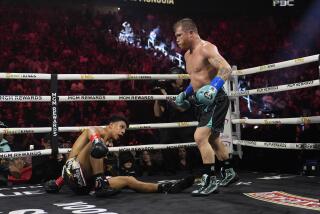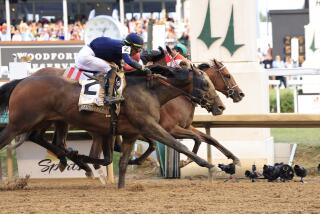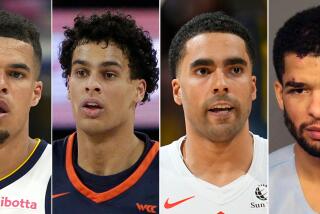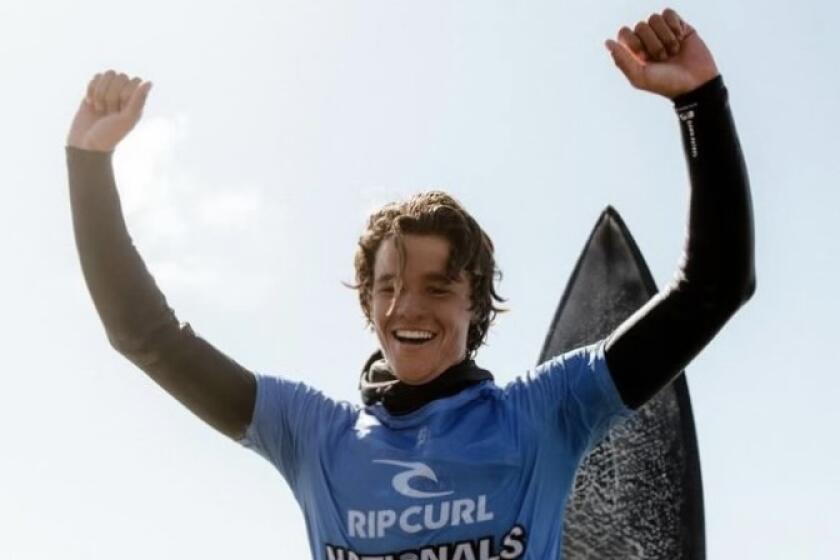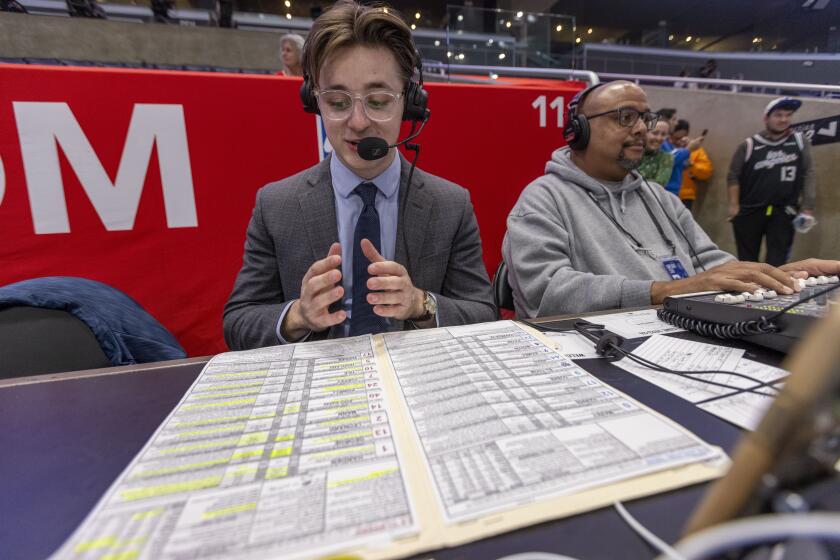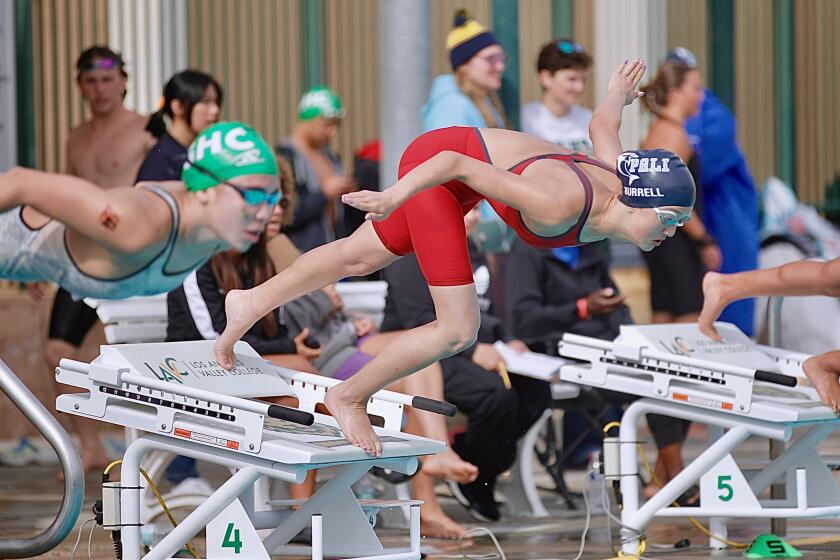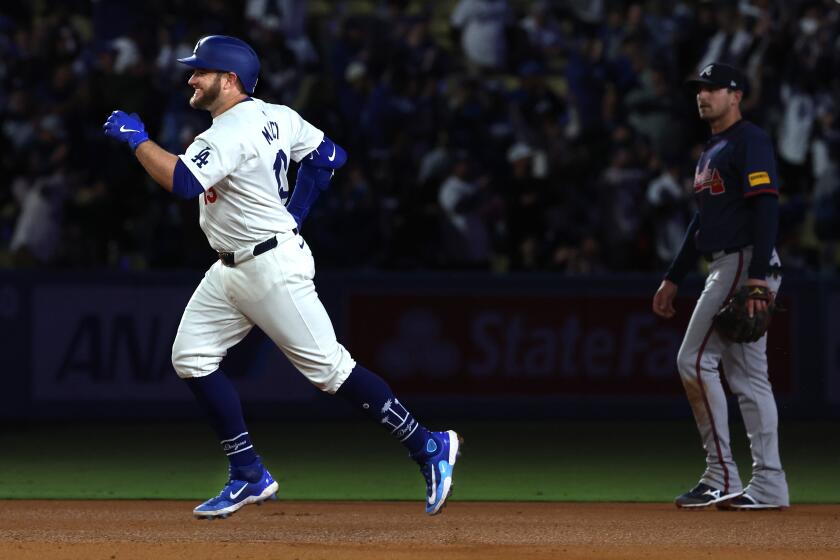His Way Was the Highway
Phil Jackson left Los Angeles on Sunday morning, bound for his house on a lake in Montana.
By late afternoon, his cellphone close by, he felt the urge to say farewell.
“I’m several hundred miles north and east of L.A.,” he said. “With one night in a hotel, I can be at the lake by nightfall tomorrow.”
For the next 45 miles or so, broken up by occasional lapses in satellite signals, he spoke of his five years in Los Angeles, the championships they won, the relationships that tore at them all, and where they would all be by, well, nightfall tomorrow.
He wrote a journal of the season that will be published, he said, in the fall. He finished the manuscript this week and sent it off. He left behind Jeanie Buss, his love for most of his time here, and they remain a couple, despite the Nevada highway that flew from beneath his black Mercedes on Sunday.
On June 18, Jackson met for a few minutes with Jerry Buss, Jeanie’s father and the Laker owner. At the end of three NBA titles, countless sellouts at Staples Center and an era of basketball Los Angeles had never seen, nor will again, Buss told him he would not return.
Jackson knew it for months.
“I’m content,” he said. “I’m happy I left. It looks like the right time to leave. They wanted to make some moves to accommodate signing Kobe. We knew they probably wouldn’t work if I was coaching the team.”
But, he insisted, “I’m not back because I didn’t want to come back.”
So, he gained on north and east, his successor the day before having called him “probably the greatest coach to ever coach the game,” nine championships suggesting it is at worst a tie. His record in 14 NBA seasons was 832-316. He was 175-69 in the postseason. He coached Michael Jordan and Shaquille O’Neal and Kobe Bryant and countless nobodies into doing something special, and now he was 58, out of a job, pointed toward a lake.
“I don’t anticipate coaching,” he said. “I wouldn’t rule it out. But I don’t anticipate I will. I may coach a group of AAU kids somewhere. But I’m not going to solicit an NBA job.”
Maybe that’s so because there will never be another one like this one. The Lakers as Jackson knew them are gone, just as he had feared. Bryant still might return. Jackson thinks he should. But Buss wants to trade O’Neal to Miami. The triangle will be replaced by Bryant, solo, this time willingly.
The players will change, and the system with them. Before he left, Jackson shook hands with Buss and told him he would not be taking that vice-president job because he did not believe in the direction the club had taken. He made peace with Kobe, as much as he could, and told Shaq to keep at it.
“You can’t replace Shaquille, there’s no doubt about that,” Jackson said. “He’s a unique player. Los Angeles is going to have to say goodbye to any chance of being a multiple champion in the near future.... It’s a very daunting task without that force in the middle.”
Not even Bryant, 25, free and unbound, he said, would change that.
“That’s probably not going to happen,” he said. “It’s just too difficult to win without a dominant big guy in the middle.”
If true, perhaps they all will recall these five years as the best of their careers, Jackson for making something of their previous failures, O’Neal and Bryant for winning in spite of themselves, for their three, almost four championships, almost together.
As he drove off, Jackson was asked if it went by so fast, if it had all disappeared so quickly behind him, that it seemed to never have happened. Soon, he’d be in Montana, and the Lakers wouldn’t look like the Lakers, and training camp would open without him.
“There’s always those banners up there on the wall at Staples,” he said. “It’s the journey that’s important. It’s about the relationship that starts with the first practice and ends with the last game. After that, it’s all ethereal and fleeting. You can hold onto that ring. But you might get a cup of coffee with that ring. It’s the act itself that’s the worthwhile thing. That’s the effort that counts.”
He gave that to Rick Fox. To Robert Horry. To Derek Fisher. To Mark Madsen. To so many.
From a few, he said, “I learned that winning doesn’t always make people happy. There’s a lot of back-biting and selfishness and ego gratification. It’s not enough for everybody, even when you win, sometimes. I don’t know if it’s the price of the NBA itself or the fact it takes such a heavy toll on our lives that makes it so difficult for all of us.”
In February, when Buss announced he had suspended negotiations for Jackson’s contract extension, Jackson knew he would not coach the Lakers beyond this season. He told Bryant as much, shortly after Bryant had gone public with his distaste for Jackson off the floor. The two agreed that given a finite period and a single goal, they might not be able to live with each other, but they could work together. They lost in the NBA Finals, closer perhaps than they thought they’d get.
In fact, Jackson said, he’d intentionally, well, sabotaged his early negotiations with Buss, asking for $10 million or more per season. He needed time to measure his connection to Bryant, who had been through a difficult summer after being charged with felony sexual assault, and so already was thinking five years was enough.
“It’s hard for me to describe my relationship with Kobe,” Jackson said. “I had an exit meeting that went really well with him. I wished him well and hoped he’d find happiness with a team. And happiness playing ball.”
Jackson could not say he was worried for Bryant, who will live with what remains of the Lakers, or leave them. And, then, he will go on trial for rape. Jackson sounded as though he felt sorry for Bryant, who could not be satisfied in victory, no matter how complete.
“A championship wasn’t enough to make Kobe happy,” he said. “I noticed it wasn’t enough. It was OK. It was a notch in his belt. But it wasn’t his end result.”
He wishes Bryant would stay.
“That’s his decision,” he said. “I don’t think he’ll find any more adoring fans than he has in L.A. For that reason and others, it’s probably best he stays.”
O’Neal was different from Bryant. He wasn’t much for the process, but reveled in the championships, standing amid champagne showers as Bryant sobbed in the bathroom. While Bryant’s anger with Jackson mostly stayed hidden, O’Neal blasted away in the newspapers. When relayed what O’Neal had said, usually some alliterative phrase including his first name, Jackson would grin and chip back, and eventually they’d all laugh. O’Neal believed in Jackson.
Miffed at Mitch Kupchak and already having demanded a trade, O’Neal once again skipped his exit meeting. Jackson caught up to him later.
“We cleared a lot of space,” Jackson said. “I think we were able to part with some sense of goodwill and peace. I told him I hoped he finished his career strong. He thanked me for what we were able to do together.”
They lined Buss’ window sill with trophies. They filled three fingers with diamonds. They brushed confetti from their hair and danced on a stage with half the city, it seemed, dancing with them. They did that together, mostly. They did it in a way it had never been done before.
“I don’t know if I ever felt totally embraced by the organization,” Jackson said. “But I was by the city.”
The, uh, organization?
“What kind of relationship would you have if your daughter was romantically involved with the coach?” he asked. Well, there was that.
Then they failed, and did that singularly, too. They wept. They argued. O’Neal called it his team, Bryant called O’Neal fat and lazy, and Karl Malone and Gary Payton stood between them.
In the end, they were three victories short, an injury long, and Jackson’s career, perhaps, ended with him surrounded by his children.
A few days later, Buss made it official. Then he went about building another kind of team, one that runs and dunks and supports the things that Bryant does. Lately, it has caused Jackson to wince.
“He decided to go in another direction,” he said. “That’s up to him, to change the context of this team. He made up his mind earlier in the year and he was very comfortable with the direction the team was going to go. I was disappointed at the way it was executed. It makes the organization look fumbling.
“We have to dance like all the other teams were dancing. The way to do things was much simpler. There was a way to do things with grace and elan.”
The Lakers, he said, did not have to be broken up. They did not fade away. They were undone.
“We made the Finals and we weren’t healthy,” he said. “This still was a pretty good team. It would have only gotten better. Gary and Karl would have only gotten better in the system.”
So, before he packed his car trunk, before he kissed Jeanie goodbye, he spoke to the owner one more time. He would not be a vice president. He would be, well, he wasn’t sure, but it definitely wasn’t a vice president.
“I felt I was indifferent, diametrically opposed to the direction they were going, so I thought taking that position wasn’t forthright and honest,” Jackson said. “He said when things settle down, let’s talk again in September. So we will.”
Then Phil Jackson was gone, chasing nightfall tomorrow.
“I am satisfied,” he said. “I’m in a good place. I enjoyed it. It’s time to step back a little bit, find some other things to do.”
More to Read
Get our high school sports newsletter
Prep Rally is devoted to the SoCal high school sports experience, bringing you scores, stories and a behind-the-scenes look at what makes prep sports so popular.
You may occasionally receive promotional content from the Los Angeles Times.
